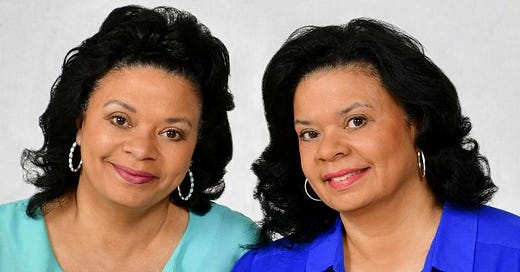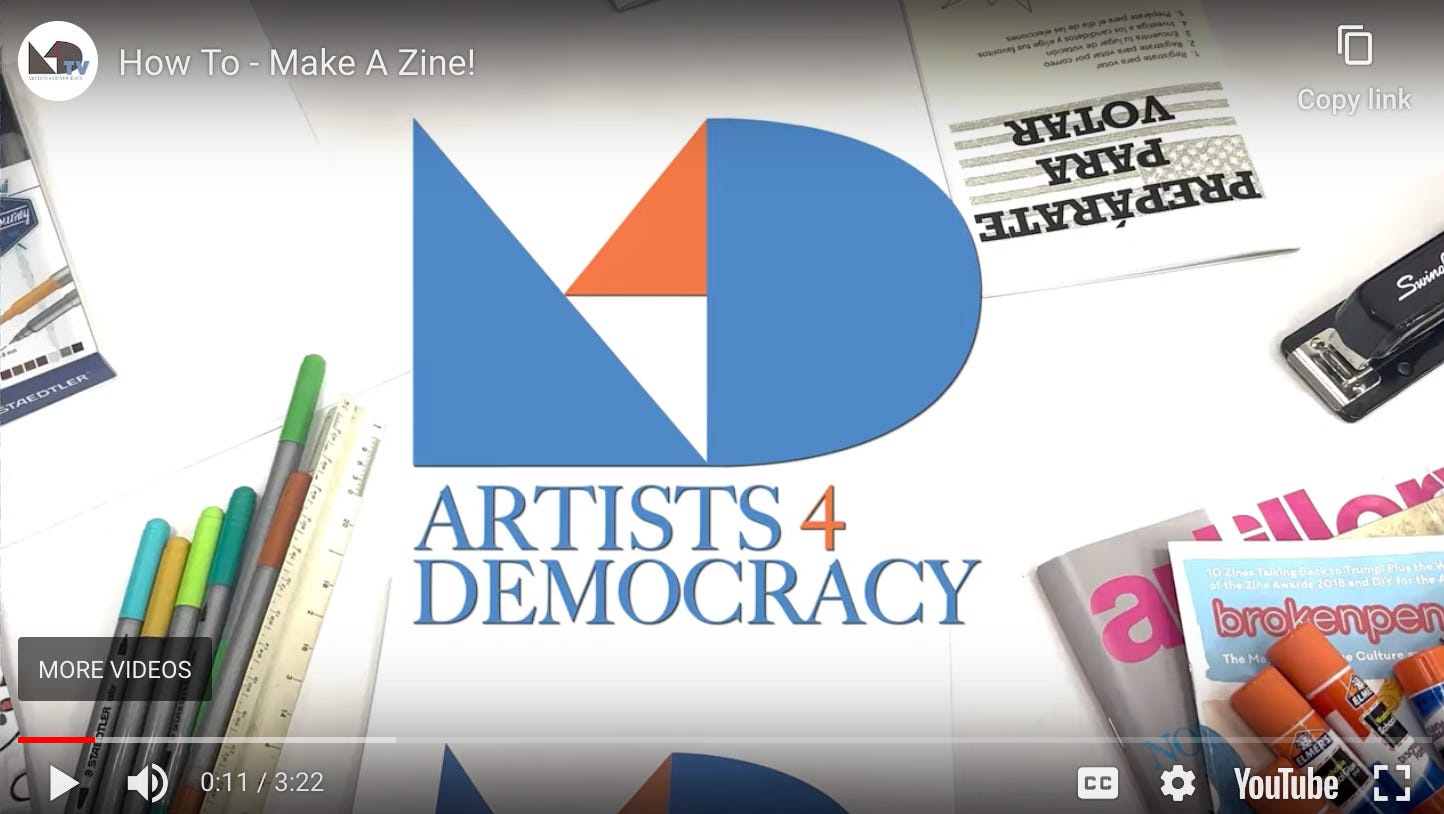How to make social media better + artist GOTV resources
“There’s more that we can do than write a play or paint a picture. We can organize as citizen-artists.” –playwright and producing artist, Yvette Heyliger
In each issue of the Artists 4 Democracy newsletter, we share actions that you as an artist can take to help strengthen our democracy. We also profile artists whose work reflects democratic values.
Want to support our work on college campuses this fall? **Donate now!**
ACTION ITEM
Let’s stop the lies on social media
Social media is our best friend and our worst enemy. The deluge of Kamala Harris memes that accompanied her elevation to Democratic candidate for President has been followed by a wave of Midwestern nice for Tim Walz. This is the good side of social media, the way it can joyfully bring us together.
There’s also the very, very dark side, filled with hate, cynicism, fake news, misogyny, racism, and just plain awfulness.
The algorithms behind our social media feeds are designed to drive us crazy and keep us addicted. Instead of information, they feed us content that riles us up and divides us from each other. But this isn’t 2016, and we didn’t just fall out of a coconut tree.
There’s a lot you can do as an artist (and a human being) to raise up the good stuff and push down the lies and cruelty. Here are top tips for how to do that, courtesy of the Indivisible Truth Brigade:
Do not engage with online disinformation. Don’t respond. Don’t re-share, even if you include a message about how bad it is. Every engagement pushes the disinformation higher in the rankings.
Don’t use the language of the disinformers. They’re very good at using credible-sounding language that has the ring of truth to tell their lies. Don’t repeat their phrasing, no matter how catchy it is, not even to discredit them.
Redirect to information from official sources. By linking to sources of accurate, unbiased information, you can share the facts while also raising the algorithm ranking of good sources.
Keep the conversation centered on the impact on people. Stories of individual struggles, hopes, and personal victories put a face on issues and policy proposals.
From us at A4D:
Use your special talents. We are artists, and we can create our own content, using our own images, sounds, and words, to express our values and aspirations. Instead of reacting on social media, we can act. Post good stuff. Repost good stuff by other artists. Make work in the real world, too, and share it.
Scroll down for new resources from the artists at A4D. Keep on scrolling for a profile of two artists who are using their talents to make a real difference in the world.

GOTV RESOURCES
It’s not enough just to vote this year. You have to make sure everyone you know votes, too. We have some resources to help you get out the vote with friends and family:
The Plan Your Vote page on our website is full of links to help people make a plan to vote. It includes one-page zines that will help you research your ballot, for California, Arizona, Nevada, Pennsylvania, and Maine. These are free to download and print, so go ahead and share them electronically or in hard copy. More states coming soon!
Further down the Plan Your Vote page you’ll find information about how Democrats and Republicans stand on key issues, including abortion rights, climate change, and racial justice.
We’ve found art-making workshops to be a great way to share information about voting while people do something creative. You can make zines and buttons, paint tote bags and signs, or even color in stickers. Here’s a short video with tips for how to make a zine or run a zine-making workshop. (Watch our website for more videos to come.)
ANOTHER ARTIST FOR DEMOCRACY
Twinbiz: Yvonne Farrow and Yvette Heyliger
“There’s a humbleness about being a citizen and a power in being an artist. You are an ordinary person doing extraordinary things.” –actor and producing artist Yvonne Farrow
Yvette Heyliger and Yvonne Farrow have done a lot together in their lives. They shared a womb. They’ve addressed urgent social issues through theater. They were Obama Fellows during his re-election campaign, Farrow on the West Coast and Heyliger on the East. As producing artists, they were each awarded the National (now International) Black Theatre Festival’s inaugural “Emerging Producer” award. When they decided to start a business together to produce plays, the name came to them easily. Twinbiz writes, directs, and produces artistic works that educate, entertain, and serve, with a special focus on using the performing arts as a tool for social change.
Heyliger is an acclaimed playwright, producing artist, educator, and activist. Her first play was Homegirl, a full-length drama set against the backdrop of the first Black woman to win the Miss America title. Long before Barbie became a movie, she used Barbie, Ken, and Julia dolls to explore the politics of race and beauty in America. “I invited Mattel to see it, but no one responded,” she says with a sly grin. Heyliger was nominated for the NAACP’s “Best Playwright” award for the play.
Farrow, her twin sister, produced the play in LA and performed the lead role. She did the behind-the-scenes work, from booking the venue to hiring a publicist to finding insurance. “Producing is hard work. You have to truly believe in the message,” she says.
Soon, they were producing Heyliger’s plays on both coasts, on stages and in local and national festivals. Hillary and Monica: The Winter of Her Discontent is a comedy that imagines the former First Lady and the infamous intern in a chance meeting before the scandal broke. In White House Wives: Operation Lysistrata!, First Lady Laura Bush proposes a preemptive sex strike to the wives of the architects of the impending war in Iraq. Farrow choreographed the closing “showstopper” number for the comedy. In The Constituent, a new one-act, a far-right elected official rejects a request made by his constituent who, in her quest to make a difference for the reproductive health of women, is prepared to take matters into her own hands. Heyliger's newest full-length play, Carpe Noctem! (Seize the Night!) is a bedroom farce that asks, “What brings a couple of heterosexual swingers, their gay son, his new husband, a transwoman, and her closeted boyfriend all together one fateful night?”

In her 2019 play, What Would Jesus Do?, Heyliger tackled the intersection of faith, church, sex, and the HIV/AIDS crisis. Farrow played Leonta Wilson, matriarch of an African-American family whose troubles rock the Bible Church of Healing, Spiritual Release, and Deliverance. To underscore the play’s message, they arranged to have condoms handed out to audience members as they left the theater. What Would Jesus Do? swept the 38th Annual Vivian Robinson-Audelco Recognition Awards for Excellence in Black Theatre, including Heyliger for Best Playwright and Farrow for Lead Actress. The play was recognized with a National Black HIV and AIDS Theatre Initiative proclamation from the Los Angeles City Council and the Hollywood/Beverly Hills NAACP nominated Farrow for a “Best Producer” award.
Twinbiz’s work goes beyond theater. Taking a seed of truth from her own life experience transitioning from concert dancer to actor due to life-altering injuries, Farrow wrote, directed, produced and starred in the short film, I’d Rather be Dancing, about a dancer who is paralyzed from the waist down and struggles to redefine herself, coming full circle to understand that, “The spirit of a dancer doesn't die with the use of her legs.”
Farrow was writing her thesis for a master’s degree in arts management when the George Floyd protests for racial justice exploded across the country. Wanting her academic work to have greater impact in the real world, she surveyed African American civil servants to gather ideas for how local governments could help heal their workforces, and as a result, their cities. Talking about her career as an actor, model, dancer, filmmaker, producer, and now arts manager working in local government, Farrow says, “I want to add to democracy and how we can fulfill the dream of it. How do we make sure our government agencies reflect the spirit of democracy?”
She is firmly committed to the idea that government has the power to do good. The challenge, she says, is that “people really don’t understand how government works and how it can work for them.” A lifetime of experience has shown her that no matter where you live, your member of city council or county board is approachable. Voters get to decide who will represent them in local government. Once they are elected, she says, residents can and should continue to engage with them, to advocate for what they want for themselves and for their communities.

For an artist to be inspired to activism, Heyliger observes, it usually takes a very personal experience. Growing up in Washington, DC, the sisters were in Girl Scouts. Their mother worked for the mayor and two city council members, and they would sometimes help her on political campaigns. As members of the school’s first four-year graduating class, the sisters fought for the survival of their nascent performing arts school, the Duke Ellington School of the Arts, which celebrates its 50th birthday this year. Community service was part of who they were.
But it was when her grandson and son-in-law were caught in a gunfight on the streets of Harlem that Heyliger was inspired to join the fight for common sense gun laws. She wrote a piece that was published in 24 Gun Control Plays, but she didn’t stop there. She became a volunteer leader with Organizing for Action, partnering with organizations like Moms Demand Action and National Action Network and organizing events to educate the public. Most notably, she organized a rally in Harlem for Team 26 as they passed through on the Second Annual Sandy Hook Ride from Newtown, CT, to Washington, DC. The event featured a host of community leaders and stakeholders, City Council members, and former Congressman Charles Rangel. As a citizen-artist, she has worked on many issues including immigration, equal opportunity and pay for women+ artists, and the #MeToo movement.
She offers a list of things artists can do for democracy that is as varied as artists are:
“You can march, post on social media, write letters to the editor and your elected officials, volunteer by knocking on doors and passing out flyers, start a petition, join a phone bank, become a poll worker, register people to vote, run for office, donate, and most importantly vote in elections up and down the ballot. As we have seen, no public office is insignificant in today's theater of politics.”
Earlier this summer Heyliger issued a Call for Propaganda Plays to Get Out the Vote. Plays will be selected for an “October surprise” public reading on October 26. The deadline to submit your ten-minute play is September 15 - download the call here:
“We all have a responsibility to use our work and our god-given talents in the service of democracy. Artists have a dog in this fight,” she says. “As producers, Yvonne and I put work into the world that does just that.”
Follow these links to learn more about Yvette Heyliger and Yvonne Farrow.
Thanks for reading the Artists 4 Democracy Newsletter. Artists 4 Democracy promotes democratic and civic engagement by mobilizing artists to get involved in political action. Through voter registration drives, fundraisers, and events we seek to foster and protect our participatory democracy.
A4D is run 100% by artist volunteers. If you’d like to contribute to our work to get out the vote on college campuses this fall (here’s one example!), please donate here.





